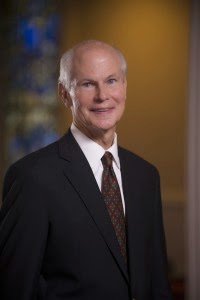
Sir Joseph Barnby was an English composer and conductor.

Sir David Valentine Willcocks, was a British choral conductor, organist, composer and music administrator. He was particularly well known for his association with the Choir of King's College, Cambridge, which he directed from 1957 to 1974, making frequent broadcasts and recordings. Several of the descants and carol arrangements he wrote for the annual service of Nine Lessons and Carols were published in the series of books Carols for Choirs which he edited along with Reginald Jacques and John Rutter. He was also director of the Royal College of Music in London.

Dominick Argento was an American composer known for his lyric operatic and choral music. Among his best known pieces are the operas Postcard from Morocco, Miss Havisham's Fire, The Masque of Angels, and The Aspern Papers. He also is known for the song cycles Six Elizabethan Songs and From the Diary of Virginia Woolf; the latter earned him the Pulitzer Prize for Music in 1975. In a predominantly tonal context, his music freely combines tonality, atonality and a lyrical use of twelve-tone writing. None of Argento's music approaches the experimental, stringent avant-garde fashions of the post-World War II era.

James Litton was an American musician, who directed the American Boychoir from 1985 to 2001, and is widely recognized as one of the leading choral conductors of the day.

W. Benjamin Hutto was an American musician who specialized in writing, producing, and directing choral music. He served as Director of Choral Activities and Director of Performing Arts at St. Albans School for Boys and the National Cathedral School for Girls in Washington D.C. He was also Director of Music and Organist at St. John's Episcopal Church, Lafayette Square.

Richard Sidney Hickox was an English conductor of choral, orchestral and operatic music.

William Ifor Jones was a Welsh conductor and organist. Born into a large coal-mining family and raised in Merthyr Tydfil, Jones studied at the Royal Academy of Music as a scholarship student in London from 1920 to 1925. He studied the organ with Sir Stanley Marchant at St. Paul's Cathedral, London; orchestral conducting with Ernest Read and with Sir Henry Wood, ; and harmony with Benjamin Dale. He was for a time organist at the Welsh Baptist Church in Castle Street, London, worked at the Royal Opera House, as a vocal coach at Covent Garden, assisted with the British National Opera Company in the role of prompter, and was the Assistant Choir Master at St. Paul's Cathedral, London.

Francis Alan Jackson was a British organist and composer who served as Director of Music at York Minster for 36 years, from 1946 to 1982.
Gerre Edward Hancock was an American organist, improviser, and composer. Hancock was Professor of Organ and Sacred Music at the University of Texas at Austin. He died of cardiac arrest in Austin, Texas, on Saturday, January 21, 2012.
Simon Lindley is an English organist, choirmaster, conductor and composer. He was Leeds City Organist from 1976 to 2017 and is Organist Emeritus of Leeds Minster, having been organist and Master of the Music Leeds Minster from 1975 until his retirement in 2016.
Andrea Een is a violinist, violist, Hardanger fiddler, poet, and Professor Emerita of Music at St. Olaf College.
James Anthony O'Donnell is a British organist, choral conductor and academic teacher who has been a professor of organ at the Yale Institute of Sacred Music in Connecticut, United States, since 2023.
Derek Holman, was a choral conductor, organist and composer.
Sir Philip Stevens Ledger, CBE, FRSE was an English classical musician, choirmaster and academic, best remembered as Director of the Choir of King's College, Cambridge in 1974–1982 and of the Royal Scottish Academy of Music and Drama from 1982 until he retired in 2001. He also composed choral music and played the organ, piano and harpsichord.
Barry Smith is a South African organist, choral and orchestral conductor, author, and musicologist.

Robert Huw Morgan is a Welsh-born organist and choral conductor. He serves as the University Organist at Stanford University's Memorial Church.

VocalEssence is a non-profit choral music organization based in Minneapolis, Minnesota. Each year the organization presents a series of concerts featuring the 130-voice VocalEssence Chorus and its core group, a 32-voice professional mixed chorus called the Ensemble Singers, along with guest soloists and instrumentalists.
Graham Elias George was a Canadian composer, music theorist, organist, choir conductor, and music educator of English birth. An associate of the Canadian Music Centre, his compositional output consists largely of choral works, many written for Anglican liturgical use. He also wrote three ballets, four operas, and some symphonic music. In 1938 he won the Jean Lallemand Prize for his Variations on an Original Theme. At first he employed traditional tertial harmony, but the influence of Hindemith led him to introduce quartal-quintal harmony as integral to his style. Successful completion of RCCO/RCO diplomas and external degrees had demanded he attain very considerable expertise in counterpoint, and so his neoclassic deployment of contrapuntal devices such as imitation, canon and fugue is hardly accidental.
Patrick Russill is an English choral conductor, organist and music conservatoire teacher.
Vern Sutton is an American operatic tenor, opera director, and academic. A founding member of the Minnesota Opera, he has created roles in the world premieres of several contemporary operas with that company; including works composed for his voice by Dominick Argento, Libby Larsen, Eric Stokes, Conrad Susa, and Robert Ward. He was also a regularly featured singer on Garrison Keillor's A Prairie Home Companion for three decades, beginning with its first broadcast in 1974.










